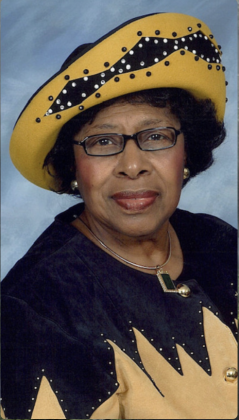Essie Lagard Bellfield, 89, former Orange mayor, voting advocate, civic leader and community champion, died Sunday, Jan. 23, 2022. Bellfield was a friend of The Examiner and longtime staff members, always available to share her insight into local issues affecting the community she served for so long. She will be sorely missed by all who knew her.
This week, The Examiner remembers Essie Bellfield and would like to share some wisdom she imparted during an interview in February 2011, when she was featured during Black History Month.
Essie Amy Lagard-Bellfield was born in 1932 during the not-so-distant past when America was still under the Jim Crow laws that segregated most of the country solely on the basis of color, but she wouldn’t let the “separate but equal” doctrine confine her to a life devoid of diversity.
Bellfield was the only child born to Ollie Byrd Keaton and Albert Leo Lagard, welcomed into the world on a very merry May day in Pittsburg, Pennsylvania. Before the year’s end, however, the infant moved with her family to Jennings, Louisiana, where she would eventually graduate from high school and continue to live while she pursued a degree in elementary education from Southern University.
As a child, Bellfield recalls Christmases that consisted of gifts of fruit; other years held even less. Tears came to her eyes as she reminisced about years when only the kindness of others made any gift at all possible.
“That’s the kind of love people can have,” she managed to say through muffled sobs. “That’s the kind of love people — black people, white people, human beings — have for each other. It’s a beautiful thing.”
During her teenage years, Bellfield was introduced to her future adopted home of Orange when her mother took a position working in the home of a prestigious landowner in the city.
“My mother lived on the premises, so it was really nice there. The people there treated us just like we were anybody else. We played with their children, even though we were different colors. It was really a good time, and they were really good people,” Bellfield said, adding that although those were some of her happiest memories, those days weren’t without struggle. “In order for me to go to Southern, I couldn’t stay in Orange with my mother as a girl.”
If she would have graduated from a Texas school, she explained, her family would have had to pay out-of-state tuition for the university of her choice. Since gathering the extra money for college tuition wasn’t an option, Bellfield was forced to live from one home to the next while in school.
“I stayed with four different ladies in four different homes. It was like I had five mothers,” she said.
Before graduating from Southern, Bellfield did move to Texas, but instead of familiar Orange, she set her sights on Galveston, where she found employment at UTMB. Aside from serving as the launching pad for her career, the Texas island also provided Bellfield a perfect backdrop for rearing her two daughters, Magna Carta (Barnett) and Colletta (Dary).
“I only made $46 a month back then, but my girls went to private school,” Bellfield said with pride.
According to her, the girls were more sheltered from racism in the Christian environment, and she still believes the education and experience was worth the money it cost to afford her daughters that privilege.
A loving mother, Bellfield would often be found with her children at her side as she went about her daily routine. One day, as she walked through a city park in Galveston, she got tired and sat down. Little did she know that simple action would result in her staging a one-woman sit-in at the park after being told “her kind” wasn’t welcome there.
“I had one baby in the stroller and another tugging on my dress, and all I wanted to do was sit at the park bench and let them play,” Bellfield said. “I sat down, but before too long this man came and told me, ‘You ain’t got no business here. We don’t want no (n-words) here.’”
Flabbergasted, but determined not to be uprooted from a park her taxes helped support, Bellfield instantly became an activist.
“I asked him what the word ‘municipal’ meant, and all I needed was for him to say it belonged to the city,” she shared. “When he did, I told him, ‘I’m part of the city and I’m gonna sit here.’”
And sit there, she did. Day in and day out, Bellfield walked her babies to the park every evening until eventually she wasn’t the only person of color frequenting the public space.
“I just wasn’t going to be chased out of there,” she said of the move that integrated the city’s park. “It, to me, was my first brush with politics.”
It wouldn’t be her last. While still living in Galveston, Bellfield headed a campaign to elect Aaron Swartz for state representative, but a job offer in Houston put politics on hold.
Then, as the economy took a downturn, Bellfield’s Houston job was phased out, which left her with her “back against the wall.” Her response was to return to Southern University to continue working toward graduation; however, just six months shy of earning a degree in elementary education, Bellfield was again called to Texas.
“A friend told me about a job in Orange, and I was looking for a two-week job during the break from classes that year,” Bellfield grinned. “I never did make it back to Southern.”
Bellfield grew sentimental as she relived the 1960 interview she shared with “the most wonderful person,” Bess Schofield, wearing her favorite lavender dress. She was hired on the spot and embarked on a career in housekeeping management at Orange Baptist Hospital that would last more than 30 years. She retired from the hospital after being awarded commendations for pioneering that field as the first Black person to belong to the National Housekeeper Association and being appointed by then-Governor Mark White to the Home Health Care Advisory Board.
Bellfield also garnered the affection of Governor Ann Richards and attended the late state leader’s memorial. She went from the state level to federal involvement when she later participated in the Freedom March alongside Southeast Texas comrades Sinclair Oubre, Raymond Scott, Velma Jeter, Amos Evans and others. Bellfield served as a charter member of Orange Community Action and Project Care, also serving the community as a member of the local chapter of the NAACP, the Southern Poverty Law Center, Council of Negro Women, Top Ladies of Distinction, Heroines of Jericho and the Salem United Methodist Church.
With a passion for politics, Bellfield became the first Black female on the Orange City Council in 1990s. Soon after, she was elected the first female mayor and the first Black mayor in the city’s history.
She served in city government through May of 2000, and she even won a bid for Justice of the Peace for a potential precinct to be added in Orange County, although the precinct was never established.
“In my lifetime, I’ve accomplished everything I wanted to do,” she said, besides visiting the Kremlin in Moscow. “Life has been wonderful to me.”
Over the years, Bellfield stayed active in community organizations and behind the scenes in political arenas. She also has added world traveler to her resume, too, playing Santa to residents of nursing homes and orphanages in China, Japan, France and England. Adding to her string of titles, Bellfield was also an actor (“Raisins in the Sun” and “Miracle Worker” for Orange Community Players); a stage director (Orange Community Players); and a PTA fundraiser extraordinaire.
One cause near and dear to Bellfield’s heart has been voting and voter registration, something she made a priority in her later years, arguing that the community has no voice without a vote.
“I’m going out to all the churches to get folks to fill out voter registration cards and memberships to the NAACP,” she said in 2011. “I don’t care if they vote wrong; they just need to get out and vote. I always keep voter registration cards on me, and if anyone wants one, I got it. Always.”
Bellfield held more than 150 awards and medals, including the key to the city of her hometown in Jennings, and there aren’t enough walls to display all her memories.
“I love all people. It doesn’t matter what you look like on the outside,” she said. “But, as you know, some people do care about that sort of thing.”
Bellfield died Jan. 23, 2022. Though gone from this world, she remains in the hearts and minds of those she left behind. Her accomplishments have paved the way for others who have and will follow her, and her influence continues to impact youth and encourage achievement.
Lamar University student Paul Ivory appeared in an article featured by the campus in honor of Black History Month. During the interview, he was asked, “What Black historical figure is most inspiring to you and why?” What was his answer?
According to Ivory, “The historical figure I find most inspiring is the former Mayor of Orange, Texas: Miss Essie Bellfield. Not only was Essie Bellfield the first Black mayor, she was the first woman elected mayor of my hometown from 1997-2000 and also served on the City Council. She was an avid civil rights leader and a true trailblazer in my community who changed the landscape of Orange forever. Oftentimes, her story of perseverance and groundbreaking achievements aren’t heard by the masses. Yet, her accomplishments against all odds inspire me to lead by example and to not be afraid to make change.”
Bellfield was laid to rest Feb. 5 at Hollywood Cemetery in Orange.



